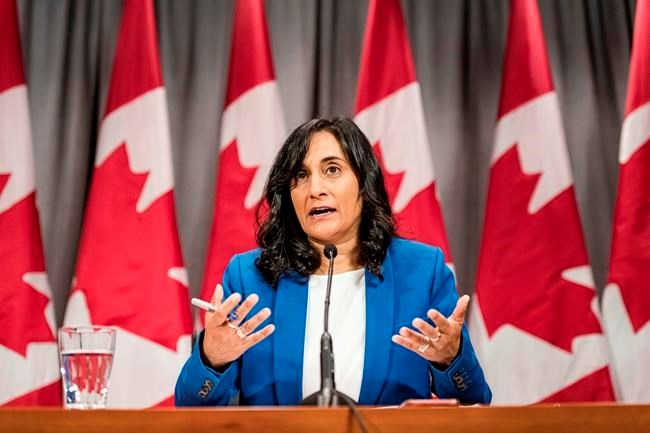OTTAWA — Canada is negotiating deals with pharmaceutical giant Pfizer and U.S.-based biotech firm Moderna to secure millions of doses of their experimental COVID-19 vaccines, in case either is approved for wide-scale use.
But Procurement Minister Anita Anand won't say yet how much Canada is spending or how many doses of either vaccine candidate Canada will get because she says Canada is in talks with other domestic and international firms to secure doses of their experimental vaccines as well.
"The information we can reveal at the current time regarding doses in particular is being kept confidential because we are taking a prudent approach to the negotiations while we are engaged with other suppliers," she said, at a news conference in Toronto.
She said there will be firm orders with multiple suppliers and options to purchase more should further doses be needed. After a company pronounces a vaccine safe and effective, Health Canada must approve it for use here before it can be used. Anand said once that happens, she anticipates delivery of approved vaccines in 2021.
"As the situation evolves and as the number of suppliers becomes more firm for Canada we can isolate precisely how many doses we might need," Anand said.
Last month Public Services and Procurement Canada issued bids to supply 75 million syringes and other vaccine administration supplies like alcohol swabs and bandages, to be delivered by the end of October. The goal is to have enough supplies to give every Canadian two doses of a vaccine.
"These agreements with Moderna and Pfizer are indicative of our aggressive approach to secure access to vaccine candidates now so that Canadians are at the front of a line when a vaccine becomes available," Anand said. "These vaccine candidates are very promising and we all look forward to the day when restrictions can be lifted entirely."
Both Pfizer and Moderna began Phase 3 clinical trials of their vaccine candidates in the last week, large-scale tests to determine how well the vaccines work. Both of these vaccines use something called messenger RNA to try to provoke an immune response to COVID-19.
They are among about two dozen COVID-19 vaccine candidates in clinical trials around the world. Dozens more are in earlier stages of development.
Both Pfizer and Moderna are part of the United States government's Operation Warp Speed program to facilitate the development and production of COVID-19 vaccines quickly.
Pfizer said July 22 that it has a US$1.95-billion agreement to supply 100 million doses to the U.S. government, with an option for 500 million more.
Moderna CEO Stephane Bancel said in a conference call Wednesday that small amounts of Moderna's vaccine have been priced between US$32 and US$37 a dose, but that the price would be lower for big orders.
Pfizer also said it expects it can produce 100 million doses of its vaccine by the end of December, and another 1.3 billion doses in 2021.
Last month both Pfizer and Moderna reported positive results from smaller trials. Moderna's vaccine was tested on 45 healthy adults between 18 and 55 years old in a Phase 1 trial in May and June, and reported a strong immune response in all people, with mild or moderate side effects such as fatigue, fever and body aches.
The Phase 3 trials will both test the vaccines on 30,000 people, and results are expected in the fall.
Canada's chief public health officer Dr. Theresa Tam warned Tuesday about expecting a vaccine to provide a quick end to the pandemic, saying they provide hope but likely no silver bullet for the novel coronavirus.
Anand echoed that sentiment, urging Canadians to continue to practice physical distancing, wash their hands and wear masks in public to prevent the spread of the virus while we await a vaccine.
This report by The Canadian Press was first published Aug. 5, 2020.
Mia Rabson, The Canadian Press
